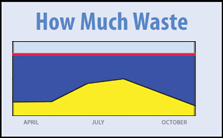Irrigation Cools The Climate… For now!
Expanding irrigation is helping feed the world's billions of people and may even mask global warming, but the future could still bring problems, scientists suggest.
Research conducted at Columbia University indicates some major groundwater aquifers, a source of irrigation water, will dry up in the future hitting people with the double blow of food shortages and higher temperatures, says an article in the journal Geophysical Research.
"Irrigation can have a significant cooling effect on regional temperatures, where people live," said Michael Puma, a university hydrologist. "An important question for the future is what happens to the climate if the water goes dry and the cooling disappears? How much warming is hidden by irrigation?"
Pumping huge amounts of heat-absorbing groundwater onto crops, researchers say, is lowering temperatures in some regions – for now. Globally, irrigation's effect on climate is small, about 0.2 degrees F. But regionally, the cooling can match or exceed the impacts of greenhouse gases, the scientists reported.
Irrigation has increased across the globe because it boosts crop yields, supporting many millions of small farmers. But concern is growing that groundwater supplies in places like India and China may not keep up.


